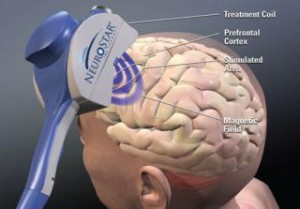Depression is a psychiatric condition, which is experienced by a lot of people. It is more than just a transient feeling of the “blues”. Depression can be a chronic and disabling disease, and in severe cases there is the risk of suicide. Great advances have been made from removing the social stigma from psychiatric illness, and cognitive therapy and effective medications can help most the patients to lead full and productive lives.
For a few patients however, depression can be drug-resistant and as a result, effective therapy will be much more difficult.
According to research by Dr. Gary Hasey at Mc Master University in Hamilton, Canada, magnets may have a future role in the treatment of mood disorders. TMS (standing for transcranial magnetic stimulation) has shown promising results in the treatment of some types of depression. A so far unpublished study found that 27% of 50 patients with drug -resistant depression achieved full response with TMS.
Simulated treatment in a control group did not produce this result in any of the patients. MRI scans have shown that depressed people have below-average brain activity in the frontal cortex of the brain. A magnetic field, which is created by passing an electric current through a hand-held magnetic coil, is aimed at the patient’s pre-frontal cortex, which stimulates the brain activity in this area. This treatment is vastly different from the well-known electro-shock treatment (ECT), where the patient needs sedation and close observation in a hospital setting. Contrary to this, TMS can be done without sedation.
The patient is conscious and can resume his normal activities after the treatment. The therapy was first discovered in the 1980’s, but a lot of research had been necessary before treatment could be made available. Other trials are also running in Great Britain, and promising results have been published in the medical paper “The Lancet”. Dr. Hasey cautions that there are still some details that have to be worked out. In the meantime Health Canada has approved TMS as treatment for drug-resistant depression.
More information about depression: http://nethealthbook.com/mental-illness-mental-disorders/mood-disorders/depression/
Reference: The Medical Post, February 1,2005, page 28
Last edited October 27, 2014






